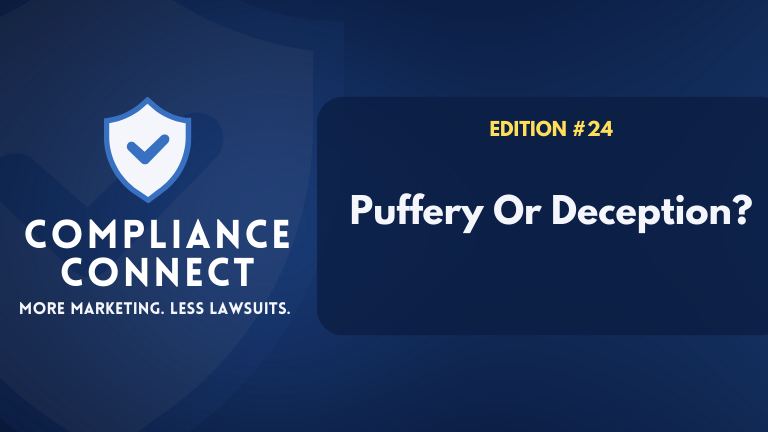Good morning! This is the twenty-fourth edition of the Compliance Connect newsletter.
The goal is simple: to keep you in the loop on what the FTC and other regulatory agencies are up to so that you can protect yourself.
These newsletters will land in your inbox twice a week – Mondays and Thursdays.
Remember: this is NOT legal advice, only information!
Here’s the rundown today…
- 🍔 Food Companies Bombarded With Deceptive Advertising Lawsuits
- ❓ Can MRR Course Creators Be Sued?
- 📞 Is It Compliant To Cold Call Prospects?
- 🔍 The FTC Reports On Common Scams For Elderly People
- 💭 How Hypotheticals Can Be Used Compliantly
Compliance Digest: What You Should Read Today
Lawsuits Accuse Burger King And Others Of Deceptive Advertising
Food companies are facing a surge in lawsuits over allegedly deceptive advertising, testing the line between puffery and deceit.
These lawsuits claim ads often exaggerate product size, ingredients, or quality. Burger King is under fire for ads showing Whoppers 35% larger than those served.
Similar cases target Wendy’s, McDonald’s, Subway and Taco Bell.
Lawsuits over “vanilla-flavored” products lacking pure vanilla and snack chip bags with too much empty space have also gained traction.
A&W and Keurig Dr Pepper recently settled for $15 million over claims their “Made with aged vanilla” sodas used synthetic flavoring.
Social media amplifies complaints, such as soggy sandwiches or smaller portions, sparking more lawsuits.
While some cases are dismissed, companies are increasingly pressured to align marketing with reality, straddling the fine line between puffery and deceit.
FTC’s Report To Congress Describes Efforts To Protect Elderly Americans
The FTC’s latest report to Congress highlights the agency’s efforts to combat scams targeting older adults.
The report reveals that older adults reported losing over $1.9 billion to fraud in 2023, with common scams including tech support, investment, and romance schemes, as well as prize and lottery scams.
Notably, older adults were more likely to lose money to tech support scams and reported higher median losses compared to younger adults.
Enforcement efforts included swift referrals to the FBI for high-dollar fraud cases, while the FTC urged Congress to restore its authority to recover funds for victims.
This is just a reminder that the elderly are a high-priority group for the FTC. If you are marketing to them, then you need to take extra precautions.

Ask Greg Mailbag #4
FTC attorney Greg Christiansen from Guardian Law periodically answers questions from members of our community.
Gerald: Can creators of Master Resell Rights (MRR) courses be held accountable for the misleading marketing practices of individuals who promote the products using strategies taught in the course?
[Note: MRR is a digital product or course that is sold with the rights to resell it to others. This business model is similar to wholesale buying in the physical world, where the buyer can rebrand the product and sell it as their own.]
If the underlying training is non-compliant, then yes the Master Resell Rights courses and individuals who promote those courses may be liable for violating the FTC Act and the false and deceptive trade practice statutes of the various states.
They are talking about a “white label” where they take the products of someone else and pass them off as their own.
If the marketing is not compliant, or the impression left is incorrect, then the individual or business white labeling or marketing the product is also liable.
Andrew: If I have an agency, is cold calling a violation of the Telemarketing Sales Rule? For example, if I have a marketing agency for local businesses, would it be a violation to open up the phone book and call local mechanics, laundromats and plumbers about my services?
The Rules of the Telephone Consumer Protection Act (“TCPA”) require express written consent to contact an individual via telephone or text.
If you don’t have consent you can’t contact anyone without violating the TCPA.
Local mechanics, etc., are also subject to the law. But remember, most of our consumers are not plumbers or mechanics. They are marketers.
If YOU have any questions about the FTC, rules and regulations, compliance best practices, and more, please send your questions to support@naoac.com with the subject line Newsletter – Question For Greg
Did You Know…
According to the recent FTC report discussed earlier, elderly adults reported losing…
- $538 million to investment scams
- $311 million to business imposter scams
- $277 million to romance scams

Quick Compliance Tip: Hypotheticals
Hypotheticals are a useful way to help a prospect understand the opportunity that you are presenting them.
For example, if you are encouraging someone to invest in real estate, it can be easy to pull out a spreadsheet and do a hypothetical example of how a rental property creates income.
Projections are made, numbers filled in, and in the end, the math shows how the prospect could potentially earn $10,000 every month if just X, Y, and Z happen.
On the outside, it seems okay. It’s clearly hypothetical. It’s even got a disclosure that it’s for example purposes only.
Here’s where the problem comes in. There’s a “projected” $10,000 income at the end of the calculations.
Unless there is a bunch of context and disclosure, there is a very good chance that the net impression being created here can be seen as an implied earnings claim.
Remember…
- Context matters.
- Disclosures matter.
One way you can COMPLIANTLY use hypotheticals is to show a small example and not to focus on large figures, even if they’re typical.
Illustrating a chart where a client makes one Shopify sale or makes 3% in an investment is more effective, in many cases, than showing clients who do millions on Shopify or make 100% per month with an investment.
- The smaller example seems more credible.
- The customer can relate more to the smaller example than a larger one.
- The small hypothetical is less likely to draw the attention of regulatory bodies.
If you’re going to use hypotheticals, you need to keep these guidelines in mind.
